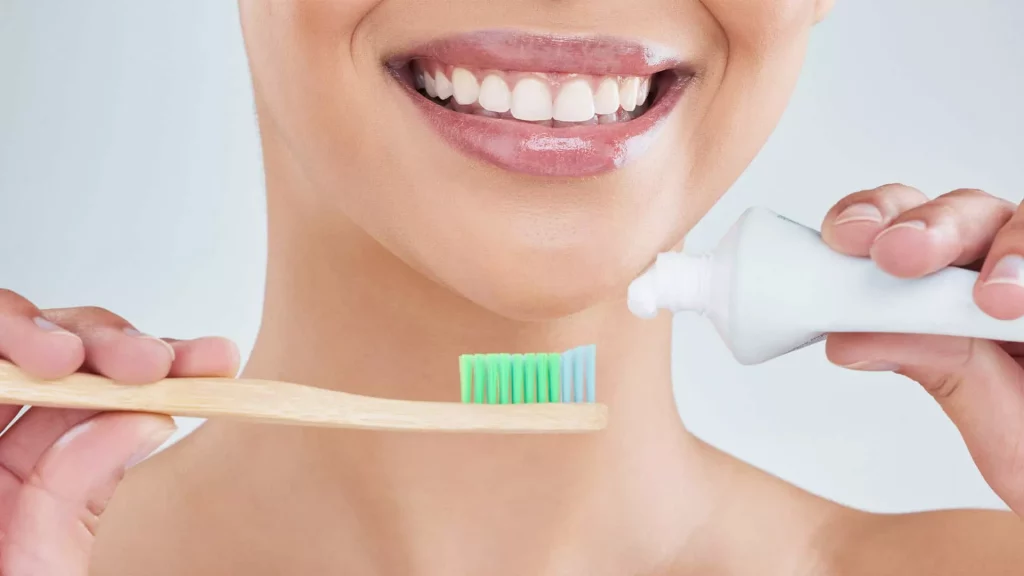Last Updated on: 27th November 2025, 10:01 am
As fall sets in and temperatures drop, your dental health will be uniquely impacted by seasonal changes. The cooler weather often introduces challenges like tooth sensitivity, which can be triggered by exposure to cold air or beverages. Additionally, seasonal allergies can increase sinus pressure, leading to discomfort in the upper teeth and gums. The dry air, combined with indoor heating, can result in a dry mouth, which reduces saliva production and increases the risk of cavities and gum disease. All and all, it impacts your oral health. That’s why fall dental care is so important!
If left unaddressed, these issues can lead to more severe dental problems. Adjusting your dental care routine for fall is essential. Whether you’re dealing with temperature-related tooth sensitivity or the effects of dry air, proper care and timely adjustments will help you stay ahead of seasonal challenges and ensure a healthy smile all year round. Read on to learn more about oral health in the fall!
How Fall Dental Care Can Help Prevent Tooth Sensitivity in Autumn

Tooth sensitivity is a common problem that affects many people throughout the year, intensifying with the arrival of colder temperatures. During the fall, exposure to cold air when going outside can trigger episodes of tooth sensitivity, especially in those with receding gums, which exposes the necks of the teeth and aggravates the discomfort.
To minimize discomfort during autumn it is recommended to:
● Breathe through your nose and keep your mouth closed when outdoors.
● Drink water containing fluoride to strengthen teeth.
● Limit consumption of foods, acidic beverages, chewing ice, and other hard or abrasive foods that can erode enamel.
● Choose a toothbrush with soft bristles to avoid wearing down your teeth during brushing.
● Maintain a daily brushing and flossing routine to keep your teeth clean and healthy.
● If you grind your teeth, consult your dentist about using a mouth guard or other device to prevent damage to the enamel.
If the sensitivity becomes persistent or causes significant pain, it is important to make an appointment with dental specialists. A professional evaluation will help identify the cause of the problem and apply the appropriate treatment to prevent the sensitivity from worsening.
Fall Dental Care for Dry Mouth

As fall sets in, the air becomes noticeably drier due to lower humidity levels, which can worsen dry mouth, particularly for those who breathe through their mouths. Dry mouth occurs when there isn’t enough saliva to keep the mouth properly hydrated, leading to discomfort. However, the implications go beyond mere discomfort, as insufficient saliva can contribute to significant dental issues.
Saliva plays a vital role in oral health. It keeps the mouth moist, helps with swallowing by lubricating food, protects both soft and hard tissues in the mouth, controls the growth of oral microbes, and aids in initial digestion. Additionally, saliva supports the healing of soft tissue and keeps the mouth clean, making its presence crucial for maintaining overall dental health during drier months.
To alleviate the symptoms of dry mouth, keep the following tips in mind:
● Try breathing through your nose to keep moisture in your mouth.
● Chewing sugarless gum or sucking on sugarless candy can stimulate saliva production.
● Maintain good oral hygiene by brushing and flossing regularly to prevent the buildup of harmful bacteria.
These practices can help protect teeth and gums while keeping the mouth more comfortable during the drier fall months.
Fall Oral Care Checklist

During the fall season, it’s important to have a dental care routine that can include the following tips:
- Refresh your brushing routine: After the lazy summer months, get back to a structured routine. Make sure you and your family brush your teeth at least twice a day with fluoride toothpaste for a minimum of two minutes. Don’t forget to floss or use interdental brushes to clean hard-to-reach areas.
- Cleaning between your teeth: is key to removing plaque and preventing problems like gingivitis, which causes red, swollen, bleeding gums. If left untreated, plaque can harden into tartar, which only a dentist can remove. If tartar isn’t removed, it can lead to periodontitis, a gum disease that causes pain, bleeding, and tooth loss.
- Choose healthy snacks: Now that school is back in session, swap sugary and starchy snacks for your kids for healthier options like raw vegetables (e.g. celery, carrots) and cheese, which naturally help clean teeth and reduce acidity.
- Stay hydrated: The cooler fall weather may make you forget to drink water. Make sure to stay hydrated; water not only keeps your mouth moist but also helps wash away food particles and bacteria.
- Control acidic and sugary foods: Limit consumption of acidic drinks like soda and juice, which erode enamel, increasing sensitivity and the risk of cavities. Opt for water between meals to protect your teeth.
- Schedule a dental checkup: Fall is the perfect time to get routine checkups to catch potential dental problems early. Regular visits prevent plaque buildup, gum disease, and other oral health issues.
- Use fluoride toothpaste and mouthwash: Fluoride strengthens enamel and prevents cavities, while antibacterial mouthwash reduces plaque and bacteria. Be sure to rinse your mouth for 30 seconds after brushing and flossing.
- Consider using a humidifier: Fall’s drier air can lead to dry mouth. Using a humidifier, especially at night, adds moisture to the air and helps maintain saliva production, which protects against tooth decay.

Fall brings with it a host of unique dental challenges, such as tooth sensitivity, dry mouth, and other seasonal changes in oral health, making it essential to adjust your dental care routine. Proactively addressing these issues with measures like staying hydrated, using fluoride toothpaste, and scheduling regular dental checkups can make all the difference.
Whether you’re experiencing discomfort or simply want to maintain your oral health, now is the perfect time to schedule an appointment with a dentist. Our team is ready to provide you with personalized care to help you meet these seasonal challenges head-on. Don’t wait for small problems to become serious; book your appointment with us today to ensure a bright, healthy smile all season long.
Frequently Asked Questions (FAQ)
References
1. Gotter, A. (2018, 29 septiembre). Why are my teeth so sensitive? Healthline. https://www.healthline.com/health/sensitive-teeth#What-causes-sensitive-teeth?
2. How to Take Care of Your Teeth as the Weather Gets Colder | College of Dentistry | University of Illinois Chicago. (s. f.). https://dentistry.uic.edu/news-stories/how-to-take-care-of-your-teeth-as-the-weather-gets-colder/
3. Office, A. (s. f.). Xerostomia. https://www.aaom.com/index.php%3Foption=com_content&view=article&id=107:xerostomia&catid=22:patient-condition-information&Itemid=120
4. Oral hygiene. (s. f.). National Institute Of Dental And Craniofacial Research. https://www.nidcr.nih.gov/health-info/oral-hygiene
5. What can you do about sensitive teeth? (2022, 6 diciembre). WebMD. https://www.webmd.com/oral-health/tooth-sensitivity














